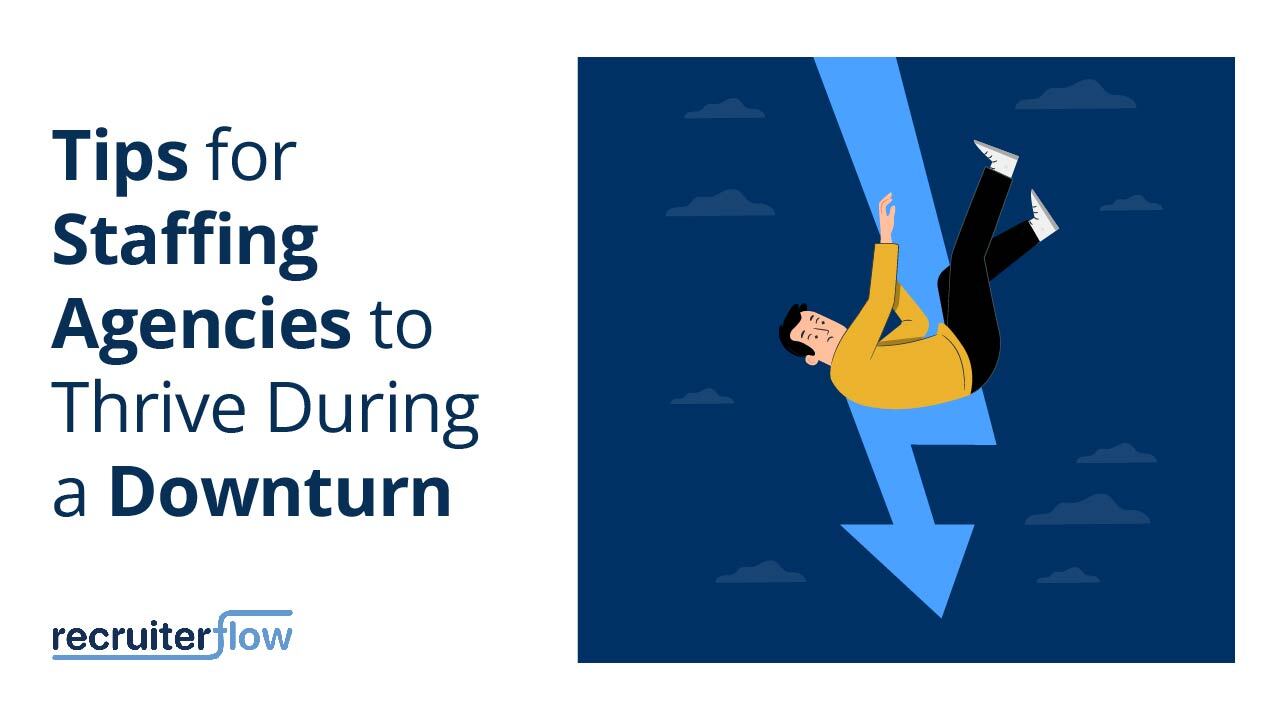
10 Tips for Staffing Agencies to Thrive During a Downturn

2023 unfolded as a rollercoaster ride for the staffing industry. Major staffing firms saw a drop of 20% in their net incomes in Q4 2023.
One central question lingers as we reflect on past year’s challenges: What lies ahead in 2024?
The University of California Los Angeles (UCLA) Anderson Forecast brings insights, indicating a diminished immediate risk of recession in the United States. However, caution surfaces with a mention of potentially weak quarters.So it is always wise to prepare for unexpected situations.
So what exactly is the best way to power through such a time?
We convened a roundtable discussion with industry experts James Osborne (TRN Co-founder), Claudio Menezes (Damia Group Founder), and Hillary Mager (Sterlind Stand Founder) to find out. Their unanimous advice: transform your recruitment strategies.
You need to anticipate the evolving job market. By crafting a proactive plan, you can not only help your agency navigate economic challenges but also continue to attract top talent and new business.
In this blog, we’ll explore strategies used by successful agencies to navigate an economic downturn!
Top ways recruitment agencies can navigate the downturn
It is said that we enter an economic crisis roughly every 10-12 years and more so without any warning. People at this stage get scared and conduct a hiring freeze.
This is where you are wrong!
People still need jobs, and businesses still need to keep running.
It’s incorrect to believe that companies won’t be recruiting anymore. But hiring top talented candidates will become more important than anything else to combat this financial fallout.
So what should you do?
1. Niche down
During a downturn, it is challenging for recruiting businesses to get new clients . This is because there may be fewer job openings overall and more competition for available positions.
The most common response is to expand your addressable market but as counterintuitive as it sounds, a better strategy is to do the opposite and niche down!
By focusing on a niche, you can be a go-to source for high-quality talent in that field. This makes it easier to attract business, and can also help you to charge higher fees for your services. Niching gives you an upper edge over your competitors who offer generalized services.
Another benefit of niche recruitment is that it helps you build strong relationships with clients and candidates in your niche. You can create a loyal customer base that is more likely to return to you for future recruitment needs.
2. Let go of your bottom 20% of performers
As a recruiting agency, your goal is to help your clients find top talent and build strong, productive teams. If you have employees who are consistently underperforming and not meeting your expectations, consider letting them go. This layoff will help you ensure that you can provide your clients with the highest level of service.
However, it is vital to approach this process fairly and thoughtfully. Before making any decisions about layoffs, it is essential to carefully review performance and provide affected employees with clear feedback and opportunities to improve.
3. Train your recruiters
Train your recruiters and don’t stop there; keep on training them. Use a learning content management system to streamline and enhance the process.
There may be a case that employees may leave and take the training along with them. But that’s life, and that’s undoubtedly what a business is. But, if they choose to stay, you will enjoy the benefits of a highly skilled cohort that acts and sounds different compared to their competitors.
They will be confident and much better informed about their niche, and they will be highly agile and able to pivot as the markets change.
So, even if the expected economic downturn happens, you will be in a better place than many of your competitors. If a dip doesn’t occur, taking the above steps will still lead you to a better shape than your competitors: a lean, mean, and agile billing machine with happy team members, candidates, and clients.
Also Read: Must Attend Recruiting Events For Recruiters
4. Look for where you can reduce expenses
Reducing expenses is one of the most obvious tips for downturn-proofing your agency. All businesses are operating on the assumption that the next quarter is going to be worse than the current one and fear drives the decision-making process.
In a situation like this, running a tight ship and keeping your expenses bare minimum gives you optionality in the long run. This optionality can be the difference between life and death for small recruiting agencies.
Cost cutting could come in various forms – allowing remote working to reduce the cost of acquiring and maintaining the office space or completely automating recruitment processes to improve efficiency.
5. Increase productivity with technology
According to Gartner’s forecast, rates of inflation, geographical disruption, and other factors cannot slow investment in technology. The forecast also revealed that companies that reduce their technology expenditures in recession risk losing key customers when the market bounces back.
Recruitment businesses have been recruiting technology as their secret weapon, wielding AI chatbots to personalize the customer experience and forge lasting bonds with their clients.
Investing in a recruiting automation solution now will offer an overall chance to do more with less—and its gains will continue to prove value when normalcy returns. Building an automation culture in your agency will ensure your recruiters are capable of adapting to future market needs at speed: a strategy that will pay dividends for years to come.
Consider using an all-in-one recruitment software for agencies that helps you to do more, bringing no impact to core activities. To read on how to choose the best recruiting automation solution for your business click here.

Recession Proof Your Recruitment Business With Recruiterflow
Rated 4.7/5 on Capterra
6. Create a scenario-based strategy
Scenario-based planning is a strategy used to prepare for and respond to potential future events or outcomes. This involves identifying a range of potential scenarios that could unfold in the future and developing strategies and plans to respond to each scenario.
This will help you navigate uncertainty and plan ahead so you can anticipate and quickly respond to changing landscapes.
Here is a four-step process for how to do scenario-based planning –
- Calculate the optimal runway that your company needs to maintain regular business operations and positive operational health
- Identify cash burns and key uncertainties that might affect cash flow in a negative way
- Put all key uncertainties into scenarios and identify pivotal drivers
How can you identify the right core scenarios to model? By answering three key questions:
- What could happen?
- What’s the potential impact?
- What are the implications of these impacts on my recruiting business?
- Reforecast and monitor each scenario
In any economic crisis, you should continually monitor and be agile to adjust between models.
7. Give an ear to potential candidates’ needs
It is always important to listen to candidates during the hiring process, regardless of the state of the economy. However, during a recession/economic downturn, it is especially important to listen to candidates and be responsive to their needs and concerns because of the following reasons –
- Increased competition: During a recession, there may be more competition for available positions, which means that candidates may be more selective about the opportunities they pursue. By listening to candidates and understanding their priorities and goals, you can better determine whether your company is a good fit for them and whether they are likely to be successful in the role.
- Talent shortages: During a recession, it may be more difficult to find top talent (counterintuitive but true! – top candidates are unlikely to make a move during such times as staying in the current job is a safer option), which means that you may need to be more flexible and open-minded when it comes to attracting and retaining top candidates. Listening to candidates can help you to understand their needs and motivations, and to find ways to meet those needs in order to keep them engaged and motivated.
- Employee retention: In a competitive job market, it is important to do everything you can to retain top talent. By listening to candidates and being responsive to their needs and concerns, you can create a more positive and supportive work environment that is more likely to keep them engaged and motivated.
8. Maintain a positive mindset
“A possible recession can also present an opportunity for recruiters. Recruiting may be even more crucial in a bad economy where companies need any competitive edge to weather the storm and best position themselves for success after it.” – Henry Goldbeck, Recruiter.com
Undoubtedly recruiting during recession times is a difficult task. Still, the actions you undertake in the current situation can prove to be of great significance for your long-term success as a recruiter and your company as a recruitment agency.
You must remember that during such time you need to focus on candidate experience and quality, not quantity.
9. Focus on velocity
You need to focus on velocity for two reasons
Deliver faster results for clients and candidates – especially important in a downturn because the decisions change fast. An opening might just be canceled.
High velocity gives you the ability to do more business development and increase your market share. It is not the big eat small, it’s the fast eat the slow situation during the recessions.
10. Choose clients wisely
It is always important for a recruitment business to choose its clients wisely in order to ensure long-term success and profitability.
Here are a few reasons why it is important for a recruitment business to choose clients wisely during a downturn:
- Financial stability: During a recession/downturn, it is important to ensure that you are working with clients who are financially stable and able to pay for your services. This will reduce the risk of working with clients who may struggle to pay their bills or who may not have the resources to support your business.
- Alignment with your values and goals: Choosing clients who align with your values and goals can help to ensure that you are working on projects that are meaningful and rewarding for your business. This can help to keep you motivated and engaged, even during a recession.
- Reputation and credibility: Working with high-quality clients can help to build your reputation and credibility as a recruitment business. This can make it easier to attract new clients and businesses, even during a recession.




Sagrika Jain